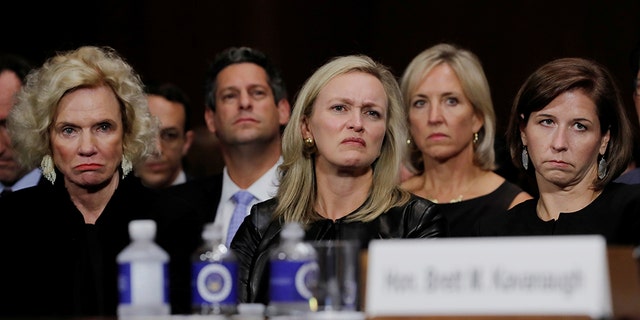Nothing
was more predictable than Republican senators embracing the FBI
investigation of Brett Kavanaugh and Democrats denouncing it.
Hours after the findings were delivered to all 100 senators, Mitch McConnell made clear that he’s ready to push through the Supreme Court nominee based on a report that vindicates Kavanaugh, and Chuck Schumer made just as clear that he’ll keep attacking the report as woefully inadequate.
And President Trump naturally welcomed the findings of the investigation he ordered under pressure from Jeff Flake and other swing lawmakers, tweeting of his nominee that "this great life cannot be ruined by mean & despicable Democrats and totally uncorroborated allegations!"
The less-than-a-week probe was always a Hail Mary pass for Kavanaugh opponents, unlikely to break new ground in what was a limited background check, not a criminal investigation.
And with uncommitted senators such as Flake and Susan Collins expressing satisfaction with the report, Kavanaugh is virtually certain to join the high court.
Stripping away the rhetoric, the GOP hoped an FBI inquiry would provide political cover for voting to confirm Kavanaugh despite the sexual assault allegations by Christine Blasey Ford and others. And the Democrats hoped that the inquiry would turn up new evidence that would require further investigation or provide enough of a delay that new accusations might surface, tipping the scales against Kavanaugh.
FBI agents spoke to nine of the 10 witnesses they tried to reach. It's hard to fathom, at least as a matter of optics, why those witnesses didn't include Ford and Kavanaugh, even though they'd already testified. This gave the minority party an opportunity to dismiss the investigation and Ford's lawyers a chance to blast the bureau for rejecting their plea to have her questioned about what she says happened when she was 15.
Not even Democrats claimed the probe had unearthed new evidence of misconduct. Instead, they said the bureau's attempt was so limited that nothing of importance could be turned up. But the Republicans are exercised too, with Chuck Grassley lecturing reporters on their bias and Orrin Hatch decrying the process that Kavanaugh was put through.
The FBI did interview the second accuser, Deborah Ramirez, who told the New Yorker that despite her memory gaps, she concluded that Kavanaugh exposed himself at a party while they were students at Yale. Her lawyers ripped the bureau for not interviewing 20-plus witnesses about her allegations.
As for other stories that have burst into the news this past week, the Washington Post reported that the White House had restricted the FBI from examining his drinking habits or any discrepancy between his testimony and past alcohol consumption.
The likelihood that this limited investigation was going to derail the nomination was always extremely small. The question now is whether the lingering impact of this raw and ugly battle will linger over not just the midterms but the country’s cultural conversation.
Hours after the findings were delivered to all 100 senators, Mitch McConnell made clear that he’s ready to push through the Supreme Court nominee based on a report that vindicates Kavanaugh, and Chuck Schumer made just as clear that he’ll keep attacking the report as woefully inadequate.
And President Trump naturally welcomed the findings of the investigation he ordered under pressure from Jeff Flake and other swing lawmakers, tweeting of his nominee that "this great life cannot be ruined by mean & despicable Democrats and totally uncorroborated allegations!"
The less-than-a-week probe was always a Hail Mary pass for Kavanaugh opponents, unlikely to break new ground in what was a limited background check, not a criminal investigation.
And with uncommitted senators such as Flake and Susan Collins expressing satisfaction with the report, Kavanaugh is virtually certain to join the high court.
Stripping away the rhetoric, the GOP hoped an FBI inquiry would provide political cover for voting to confirm Kavanaugh despite the sexual assault allegations by Christine Blasey Ford and others. And the Democrats hoped that the inquiry would turn up new evidence that would require further investigation or provide enough of a delay that new accusations might surface, tipping the scales against Kavanaugh.
FBI agents spoke to nine of the 10 witnesses they tried to reach. It's hard to fathom, at least as a matter of optics, why those witnesses didn't include Ford and Kavanaugh, even though they'd already testified. This gave the minority party an opportunity to dismiss the investigation and Ford's lawyers a chance to blast the bureau for rejecting their plea to have her questioned about what she says happened when she was 15.
Not even Democrats claimed the probe had unearthed new evidence of misconduct. Instead, they said the bureau's attempt was so limited that nothing of importance could be turned up. But the Republicans are exercised too, with Chuck Grassley lecturing reporters on their bias and Orrin Hatch decrying the process that Kavanaugh was put through.
The FBI did interview the second accuser, Deborah Ramirez, who told the New Yorker that despite her memory gaps, she concluded that Kavanaugh exposed himself at a party while they were students at Yale. Her lawyers ripped the bureau for not interviewing 20-plus witnesses about her allegations.
As for other stories that have burst into the news this past week, the Washington Post reported that the White House had restricted the FBI from examining his drinking habits or any discrepancy between his testimony and past alcohol consumption.
The likelihood that this limited investigation was going to derail the nomination was always extremely small. The question now is whether the lingering impact of this raw and ugly battle will linger over not just the midterms but the country’s cultural conversation.














